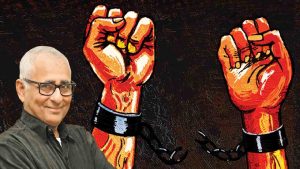Remembering Dignity

By Inderjit Badhwar
December 10th should be considered, along with all major religious landmark events like Diwali, Xmas, Eid, Gurpurab, Hanukkah, a day of reflection and the celebration of the power of the human spirit. In its own way, this date is a call to all humankind that they are endowed by their creator with the right to enjoy a life of joy and freedom from oppression. It marks the day the United Nations General Assembly adopted the Universal Declaration of Human Rights in 1948.
These inalienable rights—entitled universally, without discrimination—include the right to life and liberty, freedom from slavery and torture, freedom of expression and opinion, the right to work and education… and many more. These principles are a call to humankind to abandon the dark ages and gladiatorial and tyrannical savagery of absolutism and to awaken into a universe of freedom, of compassion, of justice.
Alas, this is only an ideal. The reality is that our much vaunted globalism is still plagued by war, terror, torture and tyranny, injustice, inequity, and inequality. That, however, should not deter us, if only for one day in a year, to remember that day in 1948 when women and men of wisdom blew the human rights bugle in a world organization and reminded us that life need not always be nasty, brutish and short.
In this special issue, India Legal, a magazine devoted to promoting the concept of universal access to justice, commemorates the importance of Human Rights Day, by inviting some of the nation’s leading luminaries, many of them former chief justices and chairpersons of India’s National Human Rights Commission (NHRC) to ruminate on this subject. I reproduce below excerpts from the thoughts they have conveyed to our magazine in interviews with our Roving Editor Sanjay Raman Sinha:
- Former Chief Justice of India MN Venkatachaliah (Read full interview here):
Q: Figures from National Human Rights Commission (NHRC), say that violations have increased by around 37% between 2020-2021 and 2021-2022. As former chairman of NHRC, how do you see the current state of human rights in India?
A: You’ve asked me about the state of human rights in India. I recall an incident when an ambush journalist asked me: ‘What is the state of Human Rights in India? Explain it in one word’. I said, ‘Good’. And she queried again, ‘If I asked you to explain it in two words’. I said, ‘Not Good’. That sums up the dilemma of the discourse. The higher level of reporting to the National Human Rights Commission is perhaps an account of the greater trust and confidence NHRC has earned over time. Second, there might be greater awareness about human rights discourse amongst people. Third, there are increases in the violations of human rights.
However, the real human rights discourse is itself at a different level. In fact, people understand it only in a narrow sense. In a broader sense, it’s a philosophy, and a way of civilised life.
- Justice Arun Mishra, chairperson, NHRC (Read full interview here):
Q: What about the rights of uncounted thousands of undertrials languishing in prisons without bail and awaiting trial?
A: The sad reality is that despite the excellent work of our Legal Services Authority and increased public awareness of the law, we have been unable to provide competent advocates to poor prisoners. I believe that the Legal Aid Service Committee should provide competent lawyers to poor prisoners. The problem is that because these prisoners, particularly those from socio-economically disadvantaged sections or with limited resources, can rarely afford a competent advocate, they are frequently convicted even when there is insufficient evidence. The appeals are assigned to an amicus curiae or inept advocate. I’ve found that in the majority of cases, entrusting these matters to a qualified advocate would increase chances of ensuring fair, efficient and equitable justice. The situation is such that the person is acquitted and released 14-20 years after completing his sentence.
- Former chief justice and fifth chairperson of the National Human Rights Commission Justice S Rajendra Babu is known for his initiatives against police brutality and capital punishment. His verdict in Kishori vs State of Delhi, delineating mob psychology, is noteworthy. (Read full interview here)
Q: How do you react to the proposition that the National Human Rights Commission is a paper tiger and toothless body which needs to be empowered to make it function effectively?
A: NHRC is a body without powers to make decrees or enforce its decisions. Hence, some people call it a “paper tiger”. However, my view is different—its role is not confrontational, but cooperative. If all stakeholders are involved in the process of recommendations and good governance which needs adherence to human rights, much can be achieved.
When children from Chhattisgarh were transported to Kashmir as prisoners by a contractor, I invoked the good offices of the two CMs, both belonging to different political parties, and they cooperated in getting their freedom. In Gujarat, after the incidents of 2002 many were dislocated from their places. While some wanted to settle down in their original place, others wanted to go to new places. Without going into the causes of the incidents, I sought the cooperation of the Gujarat government, which was extended wholeheartedly. The hallmark of good governance is to respect human rights, which all governments are aware of, but they need to be reminded often.
Post Script: These are only randomly selected quotes from lengthy interviews. There are many more that complete this issue devoted to a subject that can be the study of a lifetime.
The post Remembering Dignity appeared first on India Legal.
from India Legal https://ift.tt/H19UDWs
Comments
Post a Comment